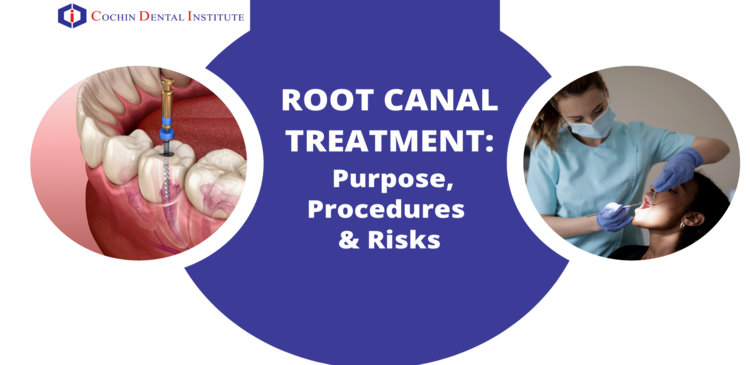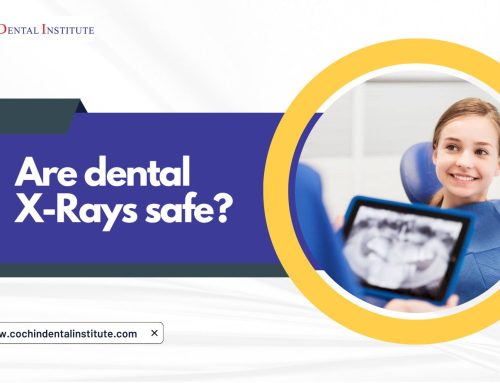Root canal treatment (also known as endodontic therapy, endodontic treatment, or root canal therapy) is necessary when the pulp (the central part within the tooth housing the blood vessels, nerves, and connective tissues) becomes infected or inflamed. This procedure is performed to save a damaged or badly infected tooth instead of extracting it. It is conducted by an endodontist or a root canal specialist.
Common causes of tooth damage include cavities occurring due to plaque accumulation, cracked or broken teeth due to an accident or trauma, gum diseases, and repeated dental treatment of a particular tooth. These can cause pulp inflammation, infection, or cause irreparable damage to the pulp which can cause excruciating pain. The pain may reduce as the pulp dies but recur as the infection spreads. Removing injured pulp is the best way to preserve the structure of the tooth. Root canal is carried out by a general dentist or endodontist while the patient is under local anesthesia.
As one of the Top dental institutes in Ernakulam, We Cochin Dental Institute provides all the information you need to know about root canal treatments including the purpose, procedure and the risks involved.
PROCEDURE
- Anesthesia: A numbing medication is administered on the gum adjacent to the affected tooth. Once the effect has taken place, a local anesthetic will be injected into the gums.
- Removing the pulp: After the tooth and its surrounding areas become numb, an opening is drilled through the crown or the biting surface of the tooth by the endodontist to access the pulp chamber. Once the infected part is exposed, it is carefully removed by the specialist using files. The specialist also cleans out the canals in your tooth carefully.
- Antibiotics: Once the infected area is removed, the area is coated with antibiotics to avoid the possibility of reinfection. Once the canals are cleaned and disinfected, the dentist seals the tooth with a sealer paste and a rubber-like material called gutta-percha. They may also prescribe oral antibiotics
- Temporary filling: The end of the procedure consists of filling the small opening in the tooth with a soft temporary material. This sealant prevents damage of the canals by saliva.
POST TREATMENT
- Take the antibiotics prescribed by the dentist regularly.
- Maintain good oral hygiene, with regular brushing and flossing
- It is advised not to drink or eat anything for a couple hours after root canal treatment.
- Avoid hard and crunchy foods for a few days after treatment.
- If the opening in your teeth was filled with the help of temporary filling, chances are it may wear off between appointments. If the entire filling wears off, consult your dentist immediately.
ELIGIBILITY
The following people are not eligible for root canal treatment:
- People suffering from hypertension or high blood pressure
- People who take blood thinners
- People suffering from diabetes
- People suffering from autoimmune diseases
- People suffering from infections and fever
- People suffering from osteoporosis
SIDE EFFECTS
- A common side effect is a dull pain in the tooth which usually vanishes a week after the treatment. However, by any chance, if the bacteria remain after the procedure, the infection may begin again. Which is why it is advised to visit the dentist if the pain stops after a while and recurs again.
- At times there may be a crack in the tooth which may go unnoticed by the endodontist. If so, the crack leaves the area exposed for infection.
- The crown may come loose which may expose the treated tooth. If left exposed for too long, the seal may erode leaving the area exposed to bacteria and infection.
- The use of defective materials during the filling process, can cause the seal to erode which may lead to recurrence of bacterial infection.
COMPLICATIONS
As with all medical and dental procedures, there are certain risks involved in root canal surgery. Listed below are some factors that can cause root canal complications such as:
-
Persistence of bacteria
The presence of bacteria within the treated tooth or at the tip of the root can cause root canal failure. This is why it is important to properly clean and sterilize the canals during treatment. You might also need a course of antibiotics to prevent risk of infection.
-
Inadequate filling
Underfilled or overfilled canals have a higher chance of failure.
-
Improper sealing
A final restoration that not only strengthens the tooth but also provides an adequate sealing to prevent infections through bacteria is important. Which is why the dentist assesses the treated area to make sure that the crown fits perfectly over your tooth.
-
Broken instruments
Root canals are carried out with the help of fine instruments that can help the dentist clean out any bacteria and residual tissue in the canal while preparing it for sealing. Sometimes, these delicate instruments may be damaged. This can affect the success of the treatment.
-
Untreated canals
Sometimes, teeth may have more canals than roots which may be difficult to find and navigate. If a canal goes unnoticed, it may cause additional complications.
RISKS
- Color change
Dental pulp is the living part within your teeth. When this is infected, it must be removed through root canal therapy. Whilst this saves your tooth from extraction, the living part of it is taken away. Tooth pulp consists of connective tissue, blood vessels and nerves. Once the pulp is taken away, the tooth essentially dies. Due to this, some patients experience some form of discoloration in their teeth.
- Sinus congestion
A fairly common risk with root canals is that they can cause sinus problems. This is due to the slight leak of the liquid of your jaw through the membranes in your nose. While this is not life threatening, inflammation in sinus cavities can cause congestion and headaches.
- Reinfection
Reinfection can happen if the treatment is carried out incorrectly. Before using fillers, it is important to clean and disinfect the tooth canals. If not carried out by a specialist, these passageways can be overlooked or inaccessible. The most common risk is that of seal failure. Once treatment is over, the access hole used for the procedure must be sealed. Any cracks or gaps in the seal can increase chance of reinfection.
- Cracked tooth
As the tooth dies during root canal procedure, the treated tooth may not be as strong as it was before and could be quite brittle. Its because the main role of the pulp was to keep the tooth nourished and moisturized. It is why crowns are recommended post root canal treatment to strengthen the outer area of the tooth again.
- Other complications
It is possible that the surrounding nerves around the affected tooth can be disrupted after treatment. In some cases, numbness surrounds the area. Another root canal risk is allergy to anesthesia. If you have experienced an allergic reaction to anesthesia during a medical procedure, it is important to inform your dentist immediately.
COST
Typically, the cost of a root canal ranges between 2000 INR to 10,000 INR. The cost of a root canal also varies depending on the city or locality, clinic, work experience, the number of teeth, the type of crown material used etc.
Follow our Website Cochin Dental Institute for getting to know all the new updates and information in the Dental Field.





